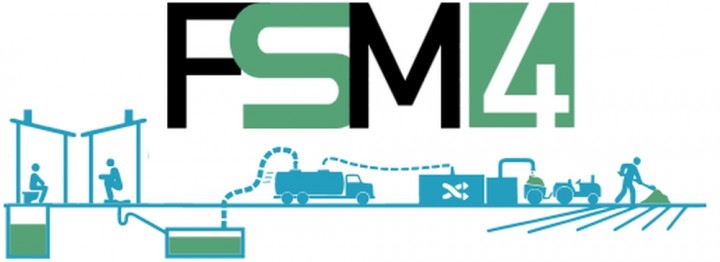
Published in: 2017
Author:
Various authors
Uploaded by:
SuSanA Admin
Partner profile:
common upload
3817 Views
137 Downloads
FSM4 was held in Chennai, Tamil Nadu, where the State Government has recently initiated measures to address FSM with regard to policy, regulatory changes, innovative solutions, and pilots. FSM4 focused on innovative and practical solutions that can be scaled up, including three tracks: research, case studies, and industry & exhibition.
Find below in chronological order the presentations held in Track 1: Research on Tuesday 21 February 2017
Content - Summary
RESEARCH 2.1: Integrated Processes – II
1.ELLEDGE, M. et al., “Continued Development and Field Testing of a Decentralized, Self-contained Toilet that Converts Human Waste into Burnable Fuel and Disinfected Liquid”, USA
2. GREGO, S. et al., “Field Testing Of Onsite Wastewater Treatment Technologies With 100% Pathogen Removal”, USA
3. PIASCIK, J. et al., “Catalytic Pyrolysis of Human Feces for Biofuel Production”, USA
4. KULAK, M. et al., “A Life Cycle Perspective on Scaling Up Sanitation in India”, UK - NO PRESENTATION
RESEARCH 2.2: Pathogen & Parasites Inactivation
1. FOUTCH, G. et al., “The Inactivation of Ascaris suum Eggs by Short Exposure to High Temperatures for the Purpose of Sanitizing VIP Latrine Sludge by Viscous Heating”, USA
2. AMOAH, I. D. et al., “Method for the Detection and Quantification of Soil Transmitted Helminth Eggs in Faecal Sludge”, South Africa
3. CHAPAGAIN, S. K. et al., ”Disinfection from Freshly Separated Fecal Matters by Applying Heat and Chemicals”, Thailand
4. HARROFF, L. et al., “Fermentation of Human Faecal Waste to Produce Carboxylic Acids and Inactivate Ascaris Eggs”, USA
RESEARCH 2.3: Biotreatment – I
1. LARAMEE, J. et al., “Integrating Lifecycle Carbon, Energy and Water Impacts into Decentralized Sanitation Infrastructure Planning”, USA
2. GUEYE, A. et al., “Is it Possible to Continually Produce Fodder on Planted Drying Beds Treating Faecal Sludge?”, Senegal
3. LALANDER, C. et al., “Treatment of Faecal Matter – A product value comparison of four treatment options”, Sweden
4. PURKAYASHTA, D. et al., “Effect of Environmental Parameters on the Treatment of Human Fecal Waste by Black Soldier Fly Larvae”, India
RESEARCH 2.4: Integrated Processes – III
1. CID, C., Hoffmann, M. “Design and implementation of integrated electrochemical wastewater treatment and recycling systems for onsite sanitation in the developing world”, USA
2. DESHUSSES, M. et al., “A Neighbourhood Faecal Sludge Treatment System Using Supercritical Water Oxidation”, USA
3. PARKER, A. et al., “The Nano Membrane Toilet”, UK
4. YEH, D. et al., “From TRL5 to TRL7: Development of the NEWgenerator™“, USA
RESEARCH 2.5: Social Aspects
1. REDDY, M. et al., “Why do Women in India not Use Public Toilets? Patterns and Determinants of Public Toilet Usage by Women in Warangal City”, India
2. WILLETTS, J. et al., “Smart Compliance in Faecal Sludge Management: Strategies to Achieve Health and Environmental Outcomes”, Australia
3. MILLS, F. et al., “FSM is Not Just an Urban Issue: Findings from a Rapid Assessment in Rural Vietnam”, Australia
4. CHILKUNDA, C.A.S. et al., ”Studies on the impact of anthropogenic wastes on growth and yield of maize and cowpea, major nutrients and pathogen load in soil” India
RESEARCH 2.6: Characterisation & Quantification of FS – II
1. PRADEEP, R. et al., “Characteristics of Faecal Sludge generated from onsite systems located in Devanahalli”, India
2. KUMAR, S. et al., “Septage Characterization in Indian Urban Centres and Standalone Treatment Options for Septage Handling & Disposal”, India
3. DIAZ-AGUADO, B. M. et al., “Maximising the Value of Fertilisers Derived from Source-Separated Human Waste in Antananarivo, Madagascar”, UK
4. SEPTIEN STRINGEL, S. et al., “Rheology of faecal sludge from VIP latrines”, South Africa
Bibliographic information
Various authors (2017). FSM4 Conference - Day 2, Track 1: Research - Chennai, India.
Filter tags
English Faecal sludge treatment processes Peri-urban Presentations Urban (entire city)














